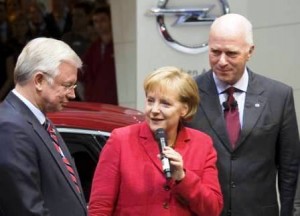
Europeans appear content to let U.S. taxpayer-owned and subsidized GM carry the Opel restructuring burden.
Last week, General Motors announced that it would triple the investment it was willing to make in its money-losing Opel/Vauxhall subsidiary from €600 million to €1.9 billion or ~$2.6 billion of the $5 billion needed to fix the company.
Nick Reilly, CEO of Opel/Vauxhall, said that the latest offer – or more likely bargaining position already privately set forth to reluctant European governments – would now equal more than 50% of the overall funding required to keep Opel solvent and provide for the new products it desperately needs. The GM contribution would be made with both equity and loans.
GM has been seeking restructuring money from European governments since the fall of 2008 when it was becoming clear that it, along with its subsidiaries including Opel, were insolvent.
Notable in its absence of support is Germany, where resentment still runs deep over GM’s refusal last November to sell Opel to Canadian supplier Magna and Russian Sberbank. At the time, GM said Opel was of strategic importance because of its engineering services and European presence.
Under its previous announced viability plan, Opel/Vauxhall had estimated funding requirements of €3.3 billion. However, as negotiations dragged on, an additional €415 million had been requested by the respective European governments to offset the potential impact of “adverse market developments.”
GM says it now will contribute more than 50% of the overall funding. As a result, the requested loan guarantees from European governments will decline in total from €2.7 billion to under €2 billion. This is still a high risk proposition for governments.
GM claims remain no “potential liquidity risks” this year.
The latest GM gambit came – and went – without any immediate corresponding public commitments from European national governments in the countries where Opel/Vauxhall operates.
Thus far, the Europeans appear content to let U.S. taxpayer-owned and subsidized GM carry the burden without the involvement of European taxpayers.
Opel has plants in Germany, the U.K., Spain and Poland and parts making operations in Hungary and Austria. The plan requires the sacking of about 17% of Opel/Vauxhall’s workforce. This means the elimination of 8,300 workers of 48,000, spread across most of Europe and includes 1,300 employees in sales and administration and 7,000 jobs in manufacturing. This includes closing of the Opel production facility in Antwerp, Belgium, as previously announced.
The German Central Government, regional government and the German Metalworkers union all had strongly supported the Magna sale as a way to preserve German jobs. And the union vow not to make any of the needed concessions without job guarantees.
When the Magna deal fell through, GM then repaid – at Germany’s insistence – a bridge loan from the German Government of €600 million, which was keeping Opel solvent.
Opel/Vauxhall needs €3.3 billion in total capital, of which €1 billion is for restructuring. The rest will be for investments in new products. Reilly expects to lose money in 2010, and the implication is that government financing is needed by next year, although when it will be forthcoming is unknown.
U.S. taxpayer funded? Another bankruptcy needed?
Where the money is coming from, now or in the future, is not a popular subject at GM. It would not exist without $50 billion from U.S. and Canadian taxpayers, and thus far Germany- where about half of Opel workers reside – is getting a free ride.
GM has clearly placed itself in a weakened, if not impossible bargaining position. Moreover, that is a huge problem GM continues to face as it tries to implement what it says is a five-year €11 billion “Plan for the Future” at Opel/Vauxhall, which will update 80% of its vehicle lines.
This is a showdown not unlike what GM faced in the U.S. when it sought government aid, which after much posturing all around, was eventually forthcoming as all parties made concessions.
However, it took a bankruptcy to accomplish that in the U.S. – something that is not being discussed, at least publicly, in Europe for Opel.
Maybe it’s time…
